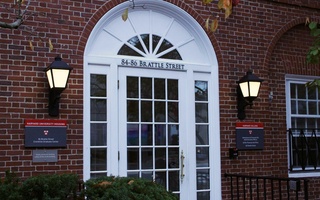{shortcode-8fd9cd7002f1a72da3368590398d9f1a645275cb}
Harvard will continue to consider the race of applicants in its admissions process, despite the Trump administration’s Tuesday withdrawal of Obama-era recommendations encouraging affirmative action, University officials said.
“Harvard will continue to vigorously defend its right, and that of all colleges and universities, to consider race as one factor among many in college admissions, which has been upheld by the Supreme Court for more than 40 years,” University spokesperson Melodie L. Jackson wrote in an emailed statement Tuesday.
U.S. Department of Justice and Department of Education officials jointly penned a “Dear Colleague” letter, which notified universities of the policy change Tuesday. The letter expresses doubts about the legality of race-conscious admissions policies at universities and high schools, and announces the departments’ withdrawal of guidelines for such policies.
“The Departments have reviewed the documents and have concluded that they advocate policy preferences and positions beyond the requirements of the Constitution, Title IV, and Title VI [of the Civil Rights Act of 1964],” the letter reads.
Department of Education representatives suggested the Obama-era recommendations were unnecessary, since the Supreme Court has already issued rulings on the subject.
“The Supreme Court has determined what affirmative action policies are Constitutional, and the Court’s written decisions are the best guide for navigating this complex issue” U.S. Secretary of Education Betsy D. DeVos wrote in a statement provided by spokesperson Elizabeth Hill. “Schools should continue to offer equal opportunities for all students while abiding by the law.”
Harvard argues its affirmative action policies are constitutional and conform to previous Supreme Court rulings.
“Harvard’s approach to race-conscious admissions has been upheld by the Supreme Court for more than 40 years, first in Justice Powell’s opinion in Bakke, again in Grutter, and most recently in Fisher II,” Jackson wrote in an additional emailed statement, referring to several affirmative action cases.
A Department of Justice spokesperson was not available for comment.
Harvard is embroiled in a lawsuit alleging discrimination against Asian Americans in its admissions process, which is expected to go to trial in Oct. 2018. The Department of Justice has taken an interest in that case; in April, the department submitted a brief in support of the plaintiffs in the lawsuit, anti-affirmative action group Students for Fair Admissions.
The department also launched its own probe into Harvard’s admissions practices, threatening legal action last November against Harvard administrators if they did not hand over admissions documents.
Though some experts called the policy change Tuesday a political move, others believe it unlikely to have any substantial effects on the lawsuit.
In comments to the New York Times, former Justice Department civil rights division official Anurima Bhargava ’96, said the Trump administration timed the policy change to coincide with a late July deadline for certain filings in the Harvard suit.
“This is a wholly political attack,” Bhargava said.
But University of California, Berkeley Law Professor David B. Oppenheimer said the move would not likely sway the outcome of the suit.
“The reason is that this is a policy change which is not influenced by any change in the law,” he said. “Here, there was no change in terms of the decisions of the U.S. Supreme Court.”
Andrew Bradt ’02, another law professor at the University of California, Berkeley, wrote that the move is unlikely to have any impact on the suit at this point.
“I wouldn't think it would have much effect on the current lawsuit, at least until the appellate stage,” Bradt wrote in an emailed statement.
The Trump administration’s letter notes this also, saying “This guidance does not add requirements to applicable law.”
Roger Clegg, president of the Center for Equal Opportunity and a former high-level Justice Department official, wrote that he believes the announcement may signal future Trump administration involvement in the lawsuit.
“I think it indicates a rejection of the Obama administration’s defense of racial preferences and, thus, is more evidence that eventually the administration will oppose Harvard in its litigation,” Clegg wrote.
Edward Blum, president of Students for Fair Admissions, wrote that his organization “welcomes any governmental actions that will eliminate racial classifications and preferences in college admissions.”
This development in the debate over affirmative action is the first to be faced by University President Lawrence S. Bacow, who took office Sunday. Bacow defended the College’s admissions policies and rejected allegations of discrimination in an interview with WBUR radio Sunday.
“There have been hundreds of thousands of documents that have been pored through at this point,” Bacow said. “There is not a single one which suggests that there is a policy to discriminate against anybody or to hold one group to a different standard than anybody else.”
—Staff writer Delano R. Franklin can be reached at delano.franklin@thecrimson.com. Follow him on Twitter @delanofranklin_.
—Staff writer Samuel W. Zwickel can be reached at samuel.zwickel@thecrimson.com. Follow him on Twitter @samuel_zwickel.
—Sanjana L. Narayanan contributed reporting.
Read more in News
With Home-Cooked Salmon, The Bacow Era BeginsRecommended Articles
-
 Justice Department to Investigate Harvard's Admissions Process
Justice Department to Investigate Harvard's Admissions Process -
 Justice Department May Join Admissions Lawsuit Against Harvard, Experts Say
Justice Department May Join Admissions Lawsuit Against Harvard, Experts Say -
 Department of Justice Threatens Lawsuit Against Harvard in Admissions Probe
Department of Justice Threatens Lawsuit Against Harvard in Admissions Probe -
 An Inflection Point: High Stakes as Harvard Admissions Trial Approaches
An Inflection Point: High Stakes as Harvard Admissions Trial Approaches -
 Kavanaugh’s Nomination May Jeopardize Affirmative Action, Experts Say
Kavanaugh’s Nomination May Jeopardize Affirmative Action, Experts Say













